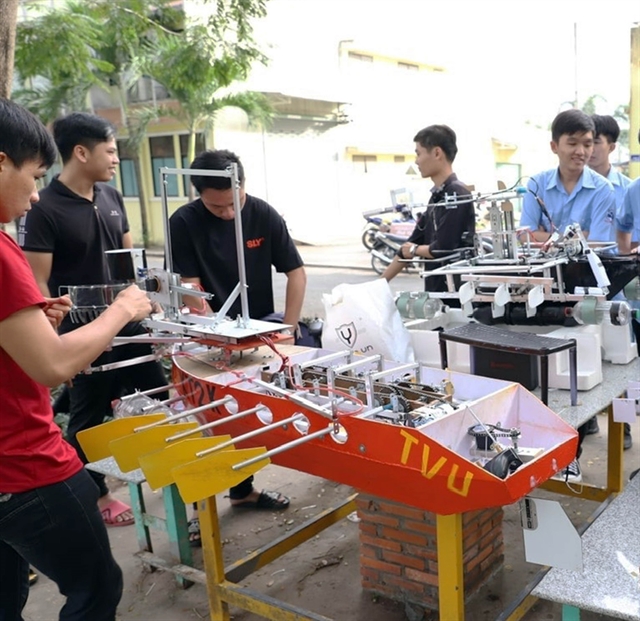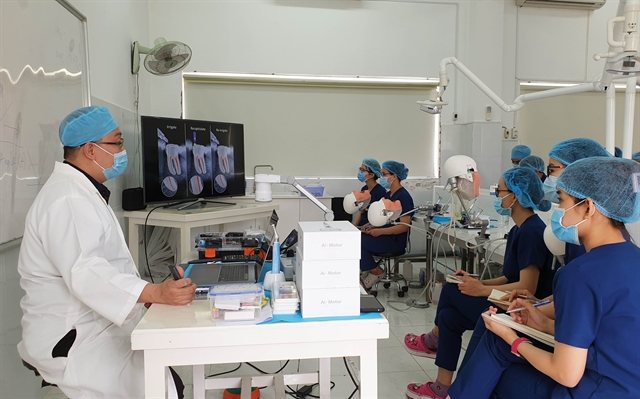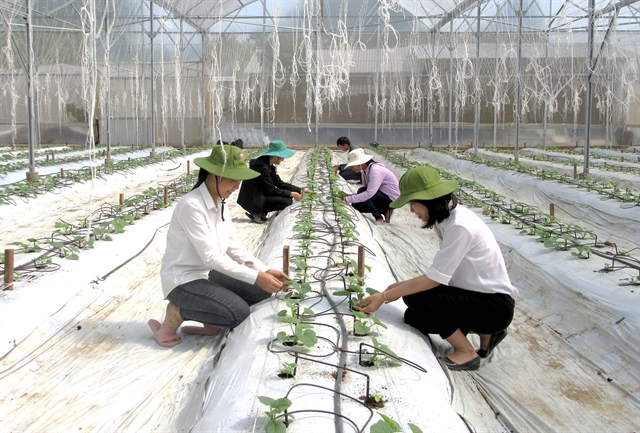 Society
Society


|
| Trà Vinh University technology students develop ROBOCON robots. — VNA/VNS Photo Phúc Sơn |
VĨNH LONG — Trà Vinh University in the southern province of Vĩnh Long has emerged as one of Việt Nam’s most dynamic higher education institutions, steadily climbing global rankings and earning international accreditation for many of its programmes.
With a 53ha campus in Hòa Thuận Ward and a teaching cohort of more than 1,000, it offers 10 doctoral, 19 master’s and 49 undergraduate programmes besides several health science specialisations.
Fields of study include agriculture and fisheries, engineering and technology, health sciences, economics, law and logistics, management and tourism, biotechnology, environment, foreign languages, culture, and arts.
The university maintains close ties with businesses and collaborates with more than 90 international partners, and has achieved substantial autonomy in academics, finance, science, training, and management.
Associate Professor Doctor Nguyễn Minh Hòa, its rector, said Trà Vinh University is among the 23 universities in the country piloting autonomy under the Government’s Resolution No. 77 issued in 2014.
Being granted autonomy in academics, organisation and finance has helped the university actively reform governance and develop training programmes to international standards, he added.

|
| A class of dental students at Trà Vinh University. — VNA/VNS Photo Phúc Sơn |
Trà Vinh University has been recognised among the world’s top 100 innovative universities with strong social impact for six consecutive years.
In 2025 it was 29th among the world’s top 400 universities in the WURI Ranking, up 13 places from 2024.
It is also among the world’s top 200 universities for green and sustainable education (UI GreenMetric Ranking), and received the Excellent Digital Transformation Award for three straight years from 2022.
To date 27 of its training programmes have achieved international accreditation based on leading standards such as the Foundation for International Business Administration Accreditation (FIBAA – Europe), ASEAN University Network Quality Assurance (AUN-QA – Southeast Asia) and the Accreditation Board for Engineering and Technology (ABET – the US).
These place it among the Mekong Delta’s leading institutions for internationally accredited programmes.
Vĩnh Long Province has identified developing high-quality human resources as a key task alongside infrastructure and digital development in its 2025–30 socio-economic development strategy.
Trà Vinh University constantly updates its curriculums to meet the business community’s human resources needs.
Its “Co-op Model” (Cooperative Education) from Canada allows students to earn an income while still studying, while businesses recruit trained workers without retraining costs.
It has also developed research and innovation centres based on local strengths, including the Mekong Delta Coconut Research Institute, and expanded cooperation with Denmark, Germany, Japan, and Taiwan (China) to develop human resources and technology for wind energy, green hydrogen and sustainable energy transition.
It aims to become an advanced, internationally integrated university, establishing a Mekong Delta Innovation and Start-up Centre and training high-quality human resources for Vĩnh Long and the delta.

|
| Trà Vinh University agriculture students test a new crop model. — VNA/VNS Photo Phúc Sơn |
In 2022 the delta’s population was 17.4 million, accounting for 17.5 per cent of the country’s, but its workforce comprising people aged 15 or above accounted for 54 per cent.
The region has 17 universities, including six non-public ones.
Many, like Cần Thơ University and Trà Vinh University, are large, taking in 3,000–10,000 students a year.
The delta provinces and Cần Thơ City have rolled out a number of policies to improve human resource quality in recent years, but challenges remain.
Only 14.9 per cent of the region’s workers have formal training and 6.8 per cent have a university degree or higher, 11.9 percentage points below the national average and the lowest among all the country’s regions, according to the 2022 Annual Economic Report.
The Politburo’s Resolution No. 71, dated August 22, 2025, on “Breakthroughs in the development of education and training,” outlines tasks and solutions for institutional reform, financial investment, improving teaching quality, advancing higher education through innovation and integration, and promoting digital transformation.
In implementing the resolution, the delta is restructuring its public university system to build strong, multidisciplinary and autonomous institutions.
Among them, Cần Thơ University and Trà Vinh University are expected to continue playing pioneering roles, sharing their experience and guiding the region’s higher education system towards sustainable development. — VNS




